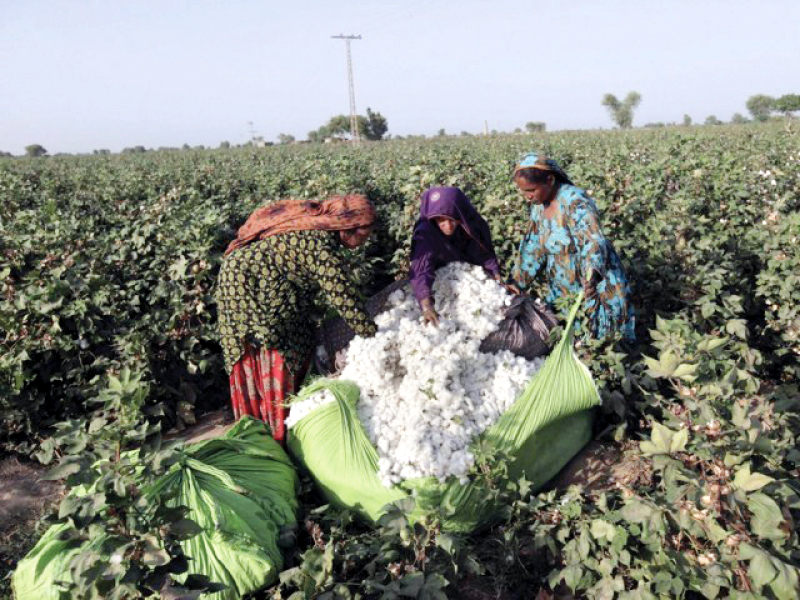
KARACHI:
The billion-dollar textile industry of Pakistan rests on the shoulders of women who are paid less than Rs150 for each day they spend picking cotton in the scorching heat. These women do not even receive the courtesy of being considered formal workers under the Labour Act.
This was highlighted at a provincial dialogue titled ‘The Issues of Women Cotton-Pickers: Discussing Policy and Legal Perspectives’ on Tuesday. Those present included seven female cotton-pickers from rural Sindh, invited to Karachi by the Sindh Community Foundation (SCF).
Standing out from the crowd in her vibrant ghagra choli and colourful bangles running from wrist to elbow, Maasi Padmi, who came from Miranpur, discussed her predicament with The Express Tribune. “Women need to fight for their rights on their own because the male farmers usually side with the landlords,” she stressed.
According to her, two to four women pick cotton all day and the landlord comes and takes it away in the evening without even telling them the weight of the gathered crop. “He pays us between Rs1,000 and Rs1,500 for the week, which we divide among ourselves. How are we supposed to pay for our children’s medical treatment or our daughters’ weddings?”

Claiming that women worked in the fields more than the men, Padmi said they deserved an increase in their wages too. “We get diseases from the crops and pesticides as well as snakebites but no one pays for our treatment,” she added, as Jamna, another cotton-picker from Hala, held up arms covered with marks and cuts.
The women waited patiently for women’s development minister Rubina Saadat Qaimkhani and Senator Saeed Ghani, hoping to voice their concerns but the two government representatives failed to show up. Meanwhile, the Sindh labour department director sent joint director Taufeeq Ahmed in their place. Instead of talking about how the labour department can help the women, Ahmed merely told them to go to labour courts to press for their rights.
Panellists from NGOs echoed, however, the cotton-pickers’ demand to be recognised as formal labourers by the government so that they could receive minimum wages and other labour rights. They added that despite obtaining the status of Generalised System of Preferences Plus by the European Union a year ago, the government had done nothing to improve the working conditions of labourers.
According to an SCF report, women account for an estimated 23.55 per cent of labourers in cotton-growing areas. “Cotton-picking by women is increasing while that by men is decreasing, supposedly because it is ‘feminine’ work, better suited to the delicate hands of women and children,” claimed Haris Gazdar from the Collective for Social Science Research. “In reality, though, this is because it is easier for landlords to exploit women and children.”
The difference between the earnings of the cotton tycoons and the female cotton-pickers who keep their empire going is stark. As the panellists pointed out, the government needs to take action before these women stop working and send the whole industry tumbling down.
Published in The Express Tribune, December 18th, 2014.









































COMMENTS
Comments are moderated and generally will be posted if they are on-topic and not abusive.
For more information, please see our Comments FAQ